If you’re willing to expand your business in the global market you must target global keywords.
Which is also known as international keywords.
Now, you need to do proper keyword research about your niche or related to your business. That’s gonna be international keyword research.
Firstly you need to understand how potential customers search for your products or services in different countries.
Simply translating your existing keywords won’t work because audiences search differently.
In this guide, I’ll walk you through the essential steps to conduct effective international keyword research that I personally use and will also help your content rank globally.

Understanding International Keyword Research
International keyword research is a process of identifying and analyzing the search terms that people use in different countries and languages.
It’s not just about translating keywords. It’s all about understanding the search intent of what your potential audience is looking for.
That’s where international keywords are different from general keywords research. It requires understanding cultural context, language nuances, and search engine preferences in your target markets.
Think about it-if you’re selling “sneakers” in America but want to expand to the UK, you’d need to know that British customers are more likely searching for “trainers.”
This simple example highlights why direct translation can lead you away from your competitors.
According to recent findings, businesses that implement proper international keyword research see up to 68% more organic traffic from their global audiences.
The core challenge stays in understanding how people in different regions search for the same products or services. For instance,
| UK | Spain | Mexico | Italy |
| Computer | Ordenador | Computadora | Computer |
| Piggy bank | Hucha | Alcancía | Salvadanaio |
| Jeans | Vaqueros | Jeans or Mezclilla | Jeans |
Using the wrong term could mean missing thousands of potential customers-even when your product is exactly what they’re looking for.
International keyword research isn’t just about words; it’s about connecting with your audience by speaking their digital language. This includes accounting for regional spelling differences (like “color” versus “colour”)
See also: Why should you Include Business Name in SEO Blog Title
The 9 Essential Steps to Mastering International Keyword Research
1. Identify Target Markets
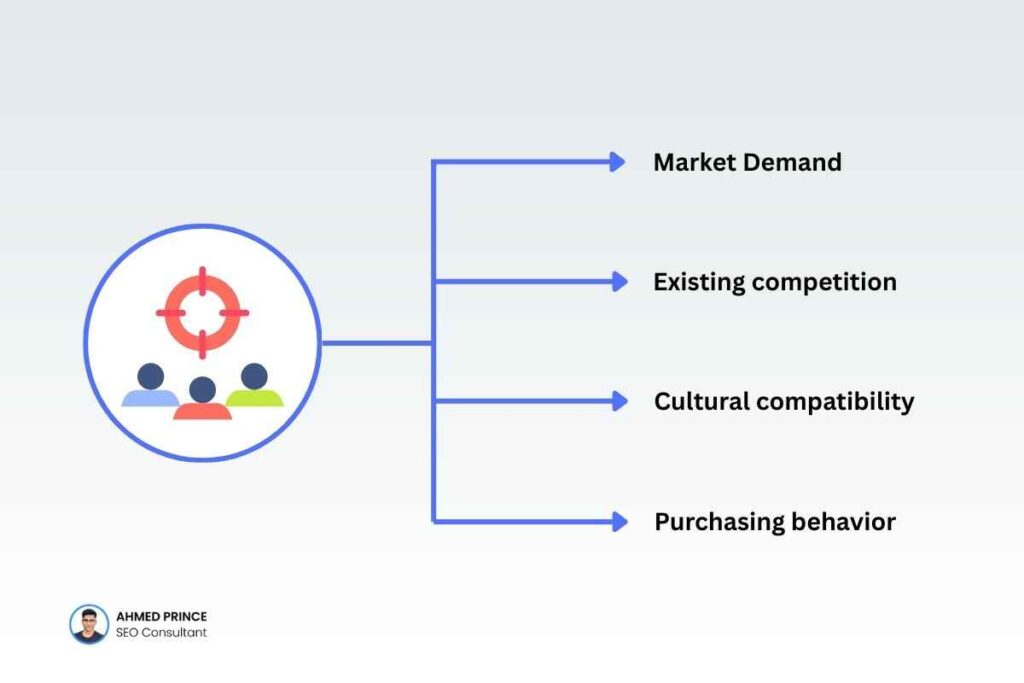
Before diving into keyword research, know exactly where you want to rank for.
Which countries or regions align best with your brand’s products, values, and opportunities?
Think about:
- Market demand
- Existing competition
- Cultural compatibility
- Purchasing behavior
Tip: Use market research tools like Statista or Google Market Finder to spot high-potential regions before you invest time and resources.
2. Understand Local Search Behavior
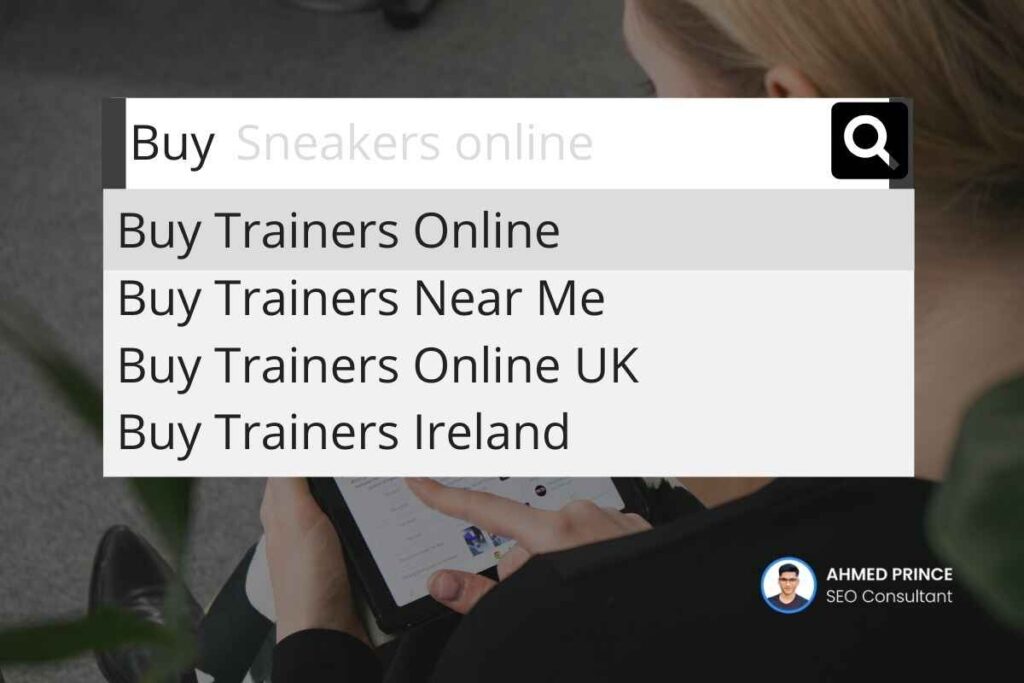
Here’s the thing:
People search differently depending on where they live.
Even when speaking the same language, terminology can vary wildly.
For example:
- In the U.S., people search for “sneakers.”
- In the U.K., they type “trainers.”
Also, be mindful of slang, cultural references, and even seasonal habits.
Understanding how locals think and search gives you an extra unbeatable edge.
3. Use Native Speakers or Local Experts

I’ve seen many business owners targeting different countries and they are using only google translator to translate their product info.
That’s a huge mistake! Don’t just rely solely on translation tools. If you truly want to connect, collaborate with:
- Native speakers
- Local SEO consultants
- Multilingual content writers
You can easily reach out to them via many freelancing platforms like Fiverr, Upwork and many more.
If you get connected and hire them for translation this can ensure your keywords and content feel natural to the reader.
4. Leverage Keyword Research Tools
The right tools make all the difference. Investing in one of these tools can save you tons of time and energy.
You can categorize any topic not only that you can als analyze keywords according to the country.
These specialized keyword research platforms that support multiple languages and regions, such as:
- SEMrush
- Ahrefs
Focus on:
- Search volume in each target region
- Keyword difficulty
- Related searches
Pro tip: Always double-check that you’re analyzing data specific to your target market, not just general/global numbers. Because each country has different keyword difficulties.
5. Analyze Competitors
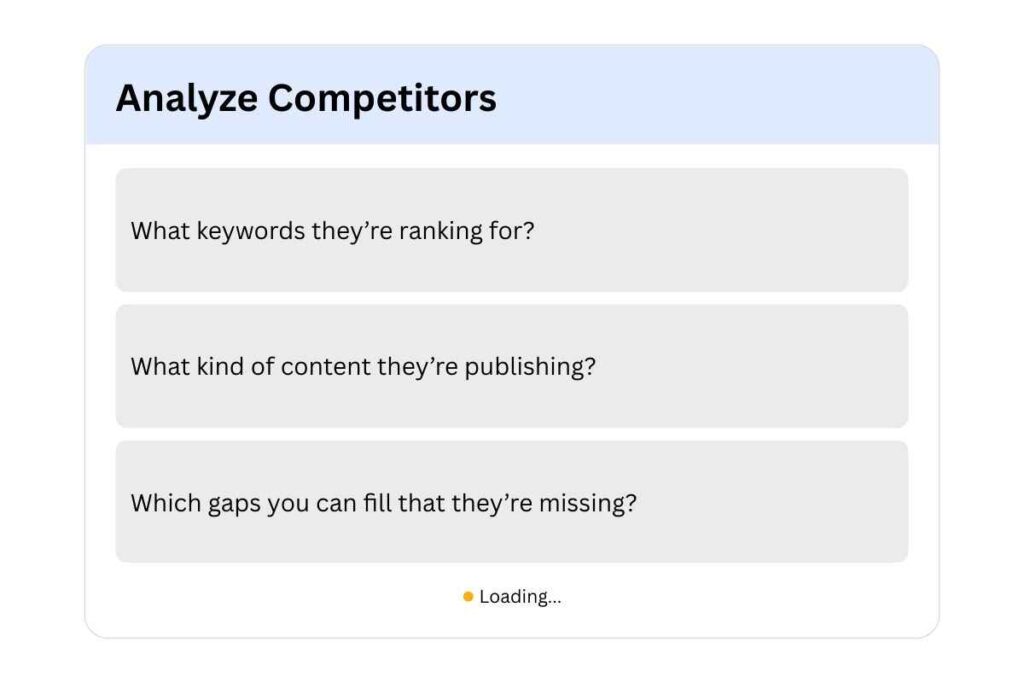
Your competitors are a goldmine of information. If they are already ranking in the top, that means they have already done the work.
All you just need to get as much information as you can from them. I don’t mean to copy them exactly but you should find out:
- What keywords they’re ranking for?
- What kind of content they’re publishing?
- Which gaps you can fill that they’re missing?
Think out of the box and study local competitors, not just international giants.
Tools like SE Ranking and SimilarWeb can help you peek behind the curtain.
6. Consider Regional Variations
Language is beautiful — and complicated.
Even if you’re targeting the same language across different countries, regional differences matter:
- “Pants” in the U.S. vs. “Trousers” in the U.K.
- “Vacation” in America vs. “Holiday” in Australia
Ignoring these nuances can confuse or even alienate your audience.
Localize your keyword lists, not just translate them.
7. Optimize for Local Search Engines
Google isn’t dominating everywhere. Because In China, people search on Baidu.
In Russia, they prefer Yandex. In South Korea, Naver is huge. I’m sure you didn’t hear that much about these search engines. But they exist!
Each platform has its own algorithms and user habits. Like google’s algorithm is different then Bing search engine.
Make sure your SEO strategy from keywords to technical setup matches the specific search engine for each region.
8. Understand Local Regulations and Cultural Sensitivities
When expanding internationally, it’s not just about language — it’s about respect.
Every country has different rules around:
- Content restrictions ( Important )
- Advertising standards
- Data privacy laws (think GDPR in Europe)
Plus, cultural taboos can vary. This is a very deep topic but it’s better to know about.
Make sure your keywords and your content don’t accidentally offend or violate local norms.
Research is key!
9. Create Country-Specific Landing Pages
Wanna have better SEO results?
To have better SEO results you must consider making different landing pages for different countries and languages.
For example:
- yoursite.com/fr/ for France
- yoursite.com/de/ for Germany
This boosts SEO because:
- Google can serve the right page to the right audience.
- You can optimize meta tags, headings, and content with localized keywords.
- Your brand feels much more personal and trustworthy to users.
Bonus: If you use WordPress you can install a plugin called TranlatePress which is partially free but works just fine.
Best tools for International Keyword Research
It’s foolish to not use tools for keyword research. Because they give you proper ideas about local search terms and all. These tools are worthy of investment.
To perform international keyword research, consider using the following tools:
1. Google Keyword Planner (Free)
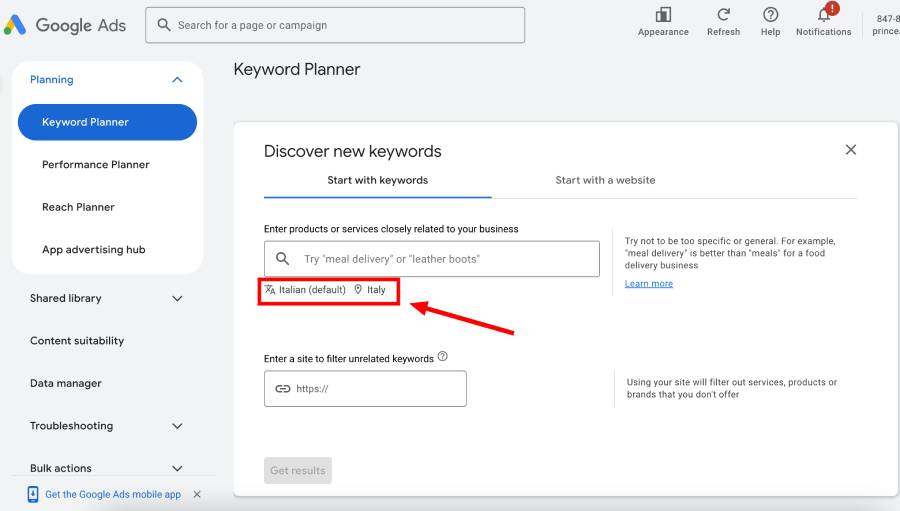
Google Keyword Planner is often the starting point for many SEO professionals. It’s free and provides search volume and competition data across various regions.
Pros:
- Accessible and user-friendly.
- Offers insights into search trends over time.
Cons:
- Some users have noted that it can overestimate search volumes.
- The accuracy of data can vary based on account spending levels.
User Insight:
“The keyword planner tool has been proven to overestimate search volumes massively… I’d recommend going for SEMrush instead.”
2. SEMrush (Paid)
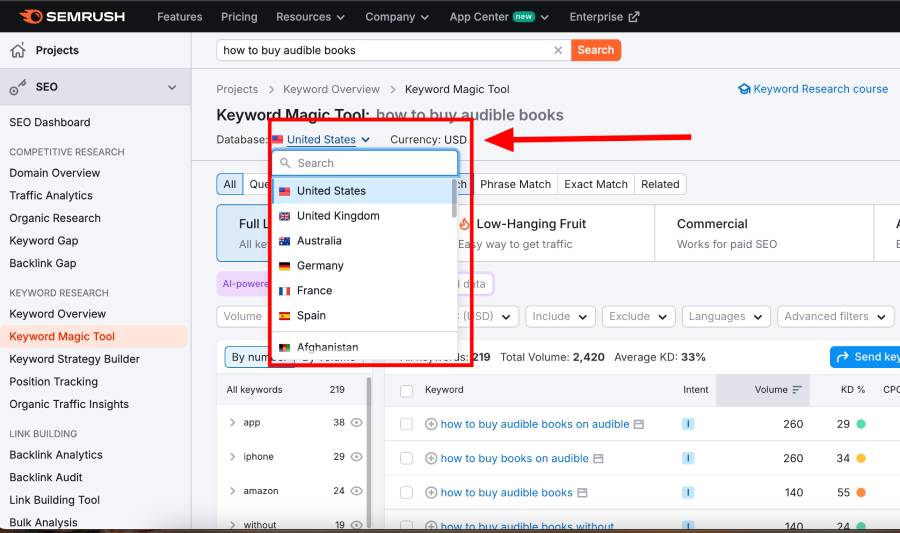
SEMrush is a comprehensive tool that offers in-depth keyword analytics and competitor insights across multiple countries.
Pros:
- Provides accurate keyword difficulty and volume estimates.
- Features user-friendly visualizations to track trends and ranking shifts.
Cons:
- Some users have reported occasional discrepancies in data accuracy.
User Insight:
“SEMrush is accurate, but not 100%. It’s good for keyword research, competitor analysis, and finding backlinks.”
3. Ahrefs (Paid)
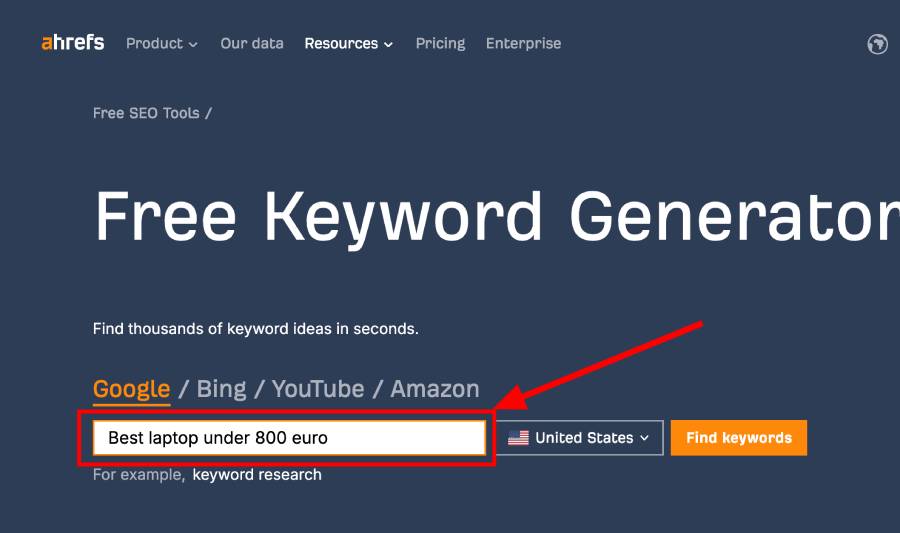
Ahrefs is renowned for its robust backlink analysis and keyword research capabilities, making it a favorite among SEO professionals.
Pros:
- Offers detailed keyword research and backlink analysis.
- Provides insights into customer behavior across multiple channels.
Cons:
- Some users feel it’s less intuitive and more suited for advanced users.
User Insight:
“Ahrefs is pretty much how we gain success with SEO. The tool is so useful for finding keywords and content opportunities, and tracking your success.”
4. Moz Keyword Explorer (Paid)
Moz Keyword Explorer is designed to help identify keyword opportunities and track rankings in different markets.
Pros:
- Offers a vast database of keyword suggestions.
- Features an intuitive interface suitable for beginners.
Cons:
- Some users find the interface clunky and data less accurate compared to other tools.
User Insight:
“Moz is less complex and easier for beginners. You didn’t make a bad choice. Learn the tool, build your understanding and re-evaluate your needs in the future.”
5. Local Search Engines: Baidu and Yandex
For countries where Google isn’t dominant, such as China and Russia, it’s essential to use local search engines like Baidu and Yandex for accurate data.
Baidu Keyword Planner:
- Provides detailed search volume data tailored to the Chinese market.
- Requires a Baidu PPC account for access.
Yandex Wordstat:
- Offers statistics on search queries, showing keyword popularity over time and across regions.
- Features an intuitive interface, making it easy to navigate and extract data.
Avoid These mistakes for better SEO
- Direct Translation of Keywords: Avoid directly translating keywords without considering cultural context and search intent.
- Ignoring Long-Tail Keywords: Long-tail keywords often have less competition and higher conversion rates. Don’t overlook them in your strategy.
- Neglecting Local Competitors: Failing to analyze local competitors can result in missed opportunities and ineffective strategies.
- Overlooking Regional Variations: Not accounting for regional differences in language and terminology can hinder your content’s relevance.
In Summary ( SEO Tips )
Once you’ve gathered and analyzed your international keyword data:
- Create Region-Specific Content: Develop content tailored to each target market, incorporating the identified keywords naturally.
- Optimize On-Page Elements: Adjust titles, meta descriptions, headers, and URLs reflect the localized keywords.
- Use Hreflang Tags: Implement hreflang tags to signal to search engines the language and regional targeting of your pages.
- Monitor Performance: Regularly track your rankings and traffic in each market to assess the effectiveness of your strategy.
Case Study: Successful International Keyword Implementation
Consider a fashion retailer expanding from the US to Spain, France, and Germany. Through proper international keyword research, what they have discovered is:
- Their main product “fall jacket” needed to be localized as “chaqueta de otoño” in Spain, “veste d’automne” in France, and “Herbstjacke” in Germany
- In Spain, searches peaked in September, while in Germany, they began as early as August
- Spanish users frequently included color preferences in searches, while German users focused more on material and quality terms
By adapting their content and PPC strategy to these findings, the retailer saw a 42% increase in international conversions within three months compared to their previous directly-translated approach.
Final Thoughts
International keyword research is a critical component of global SEO success.
By understanding and respecting the linguistic and cultural nuances of your target markets, you can create content that truly resonates with international audiences.
Remember, it’s not just about translation. It’s about connecting to your customers/ audiences.
Ready to take your SEO strategy global? Start by diving deep into international keyword research, and watch your reach expand across borders.
why international keywords research is important?
It depends if you want to target globally, because people in different countries search differently. To reach them, you need to use the words they actually type into Google.
how international keywords research works?
It’s about finding out what people in other countries search for, checking how competitive those keywords are, and picking the best ones to rank for.
key benefits of international keywords research
It helps you reach more people, get traffic from different countries, and grow your business worldwide.
Is google planner enough for international keywords research
It’s a good start, but it’s not perfect. For deep research, you’ll need extra tools and real-world insights too.
Can you help me with international keyword research?
Absolutely! I can guide you step-by-step, suggest the right tools, and help you find winning keywords for global success.




